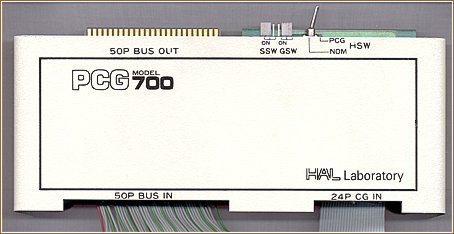| PCG700 operation
HAL Laboratory
|
|
Activating the PCG700 - Turn on the power of the MZ-700
If the switch HSW is set to the position "NOM" then the PCG700 is deactivated and your MZ-700 uses its standard character set. The MZ-700 character generator works well as if no PCG700 would exist. If you set the jumper SSW to the position "ON" then the PCG700 can be controlled by software otherwise not. To this the software can activate the PCG700 by setting bit 3 of the PCG700 port $E012 to 0. Setting this bit to 1 will deactivate the PCG700. Example: HuBASIC: The PCG can be controlled by software ( bit 3 of port $E012 ) and by hardware ( HSW ). You can prevent the software control by setting the jumper SSW to its position "OFF" even if a software will try to activate it. The PCG700 uses memory mapped I/O to be controlled by software. This
means, the software uses simple I/O commands to control the PCG700.
The ports used for all functions are $E010, $E011, and $E012.
More about the PCG700: |

